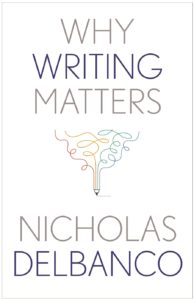You, reader of the Independent, grasping a newspaper or squinting at your laptop, probably already believe that writing matters. But not everyone does. Defending the written word’s worth is exactly what Nicholas Delbanco does in Why Writing Matters, recently reprinted in a paperback edition as part of a series by Yale University Press.
Other books in the series, all by distinguished authors on mostly lofty subjects, include Why Acting Matters by David Thomson, Why Argument Matters by Lee Siegel, Why Translation Matters by Edith Grossman, Why Architecture Matters by Paul Goldberger, and Why Baseball Matters by Susan Jacoby.
Delbanco, who lives part of the year in Wellfleet, doesn’t intend Why Writing Matters to be a comprehensive account. He focuses mainly on his own experience of writing prose fiction.

A professor of English at the University of Michigan, Delbanco is the author of 30 works of fiction and nonfiction including Spring and Fall, The Count of Concord, and The Lost Suitcase: Reflections on the Literary Life. His book The Countess of Stanlein Restored is about cellist Bernard Greenhouse’s legendary Stradivarius. (Delbanco is married to Elena Greenhouse, the daughter of the late Beaux Arts Trio cellist.)
“Writing is the junior sibling — the great-great-grandchild, even — of speech,” writes Delbanco in the introduction to Why Writing Matters. He later reflects on technology’s influence: “For now that we have books (and iPads and computer screens), the acquisition of language has shifted from the phonographic to the photographic; we see what once we heard.” Keep in mind that Why Writing Matters was first published just ahead of the surge in popularity of podcasts and audiobooks.
Delbanco addressed this in an interview with the Independent. “Our business is rooted in oral tradition, and literature began as a spoken set of words,” he said. “I stand by that. But I have to say that most of the people I know who are engaged by audiobooks listen to them in the car or take them along on a walk or a jog; it’s not the same as holding a book in your hands and sitting still and turning the pages in focused concentration.”
Concentration is something that Delbanco values. Readers will be amused by the professorial “attention checks” in the book, including one where Delbanco repeats an earlier paragraph nearly verbatim as if to say, “Made you look!”
The first chapters of Why Writing Matters detail Delbanco’s favorite childhood books, his earliest influences, and his teachers, including John Updike at Harvard. “But it’s the flat fact of my education that the seven figures who inhabit this chapter on teaching each and all are men,” he writes.
In the chapter “Five Texts,” he analyzes Karl Marx and Friedrich Engels’s The Communist Manifesto, Harriet Beecher Stowe’s Uncle Tom’s Cabin, Charles Darwin’s On the Origin of Species, Émile Zola’s “J’Accuse,” and D.H. Lawrence’s Lady Chatterley’s Lover. “Five of these six authors are male; all of them are white,” writes Delbanco with some self-awareness.

A chapter on imitation draws on Delbanco’s long-held notion of “writers as artisans: artists engaged in a guild.” It’s a craft passed down from teacher to student and refined over a lifetime. The book makes use of many musical analogies, especially in the thought-provoking chapter on plagiarism. Delbanco reminds us that Vuillaume unabashedly copied designs by Stradivarius, and composers regularly riff on each other’s tunes as a form of flattery.
In the interview, Delbanco told a story about Bernard Greenhouse studying the Bach cello suites as Pablo Casals’s protégé in Prades: “Casals insisted that Greenhouse play absolutely every note, every bowing, every intonation exactly as he did, until they were stereophonic cellos, until he really absorbed the master and was simply a carbon copy of him. And then Casals said, ‘Okay, now that you’ve got this, listen to this version of the D minor suite.’ And he played it totally differently. And he said, ‘Okay, it’s your turn. Now you make what you can of this thing that you know how to do in my mode. Now it’s yours.’ And I think that was a great lesson, not merely for music making, but for writing.”
The book includes a delightful list of 50 exercises, taken from courses Delbanco has taught at Bennington College and the University of Michigan. For example, pick any of the books on the syllabus (including Ernest Hemingway’s A Farewell to Arms, Virginia Woolf’s To the Lighthouse, and William Faulkner’s As I Lay Dying) and “introduce a dialogue or incident that the author would and should have cut.” Or “Rewrite a page; change nothing (change, I mean, nothing of substance but alter the style).” Finally, Delbanco suggests that readers revise any of these exercises “back into your own voice.” The direction comes with a jolt, like telling someone to “walk normally” or “act natural.”
Delbanco’s book isn’t so much about “why writing matters” as it is about “why teaching writing matters” or “why writing about writing matters.” It is part of a long line of books on “craft” (think: The Elements of Style or Kurt Vonnegut’s Pity the Reader). But built into it is a paradox: no one who seriously doubts the importance of writing is going to open, let alone read, a 300-page book.
The book is also, by its very nature, reflexive. It is writing about writing. It’s fitting, then, that Delbanco also takes a reflexive, more personal approach to his writing. Though this approach has its drawbacks, notably the lack of female representation in the book, it’s also honest.
Who then is the intended audience of Why Writing Matters? It appears to be writers, teachers, and other wordsmiths, who, after all, are often the ones most in need of encouragement.
“It’s not unreasonable that writing a book takes at minimum a year and usually much more than that,” said Delbanco. “And to read the book takes people a day or maybe a week. So, there’s an imbalance built into this act of communication.
“I’m not sure who said this, but it may have been Thomas Mann,” continued Delbanco. “ ‘A writer is somebody for whom writing is more difficult than it is for other people.’ It becomes more challenging the more serious you are.”
For those struggling with this most hair-pulling of arts, Why Writing Matters provides inspiration, motivation, and just a bit of commiseration.
